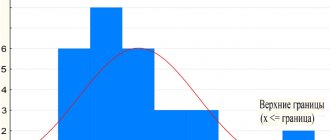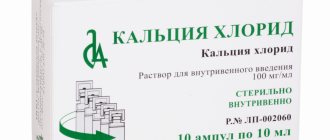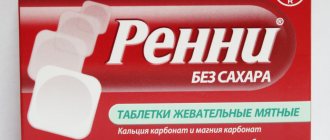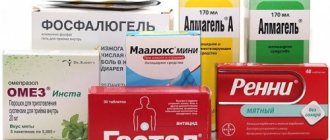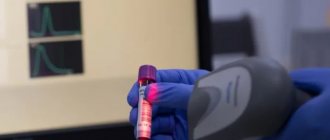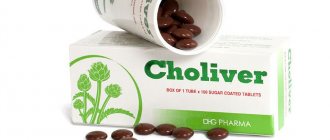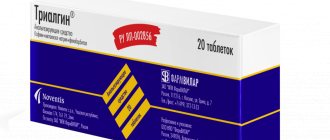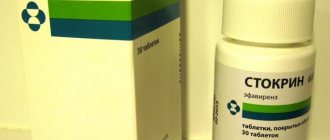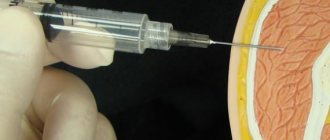An antacid medicine instantly eliminates heartburn and soothes stomach pain caused by excess hydrochloric acid. Even absolutely healthy people should buy Rennie and keep it in their home medicine cabinets. And for gastritis with high acidity and other disorders of the gastrointestinal tract, it should always be at hand.
Composition and dosage form
The drug is available in the form of large square flat tablets with concave edges of a white or cream color and engraved RENNIE. They produce pills with a cooling mint or sweetish orange flavor. Active ingredients of the drug: calcium and magnesium salts, neutralizing hydrochloric acid of gastric juice. One tablet contains calcium and magnesium compounds: 760 mg. In total. Rennie lozenges are intended to be chewed, therefore they contain special additives that help dissolve them in the oral cavity:
- starch;
- talc;
- light food wax;
- fructose;
- flavoring components: essential oils, menthol or citrus.
The tablets are packaged in metalized or plastic blisters of 6 or 12 pieces. The cardboard packaging of the drug contains from 1 to 16 plates.
Main active ingredient, release form and indications for use
Rennie is a white and creamy chewable tablet.
These are chewable tablets that are white with a creamy tint. They have a light menthol or orange scent.
For patients suffering from diabetes, an antacid is produced without the addition of any sugars. The main active ingredients are calcium carbonate and magnesium hydroxycarbonate.
The drug is packaged in cardboard blisters of 6 and 12 pieces per box. The main active ingredients of Rennie react with excess hydrochloric acid.
In this case, the latter is neutralized and the burning sensation goes away. The tablet begins to act 3-5 minutes after administration. Once in the stomach, the active ingredients form insoluble compounds. They and the remnants of the drug are excreted from the body with feces and urine. Indications for the drug:
- Heartburn, including in pregnant and lactating women
- Belching
- Feeling like your stomach is full
- Pain and heaviness in the stomach
- Various dyspeptic disorders associated with malnutrition
For more information about the drug Rennie, watch the video:
https://www.youtube.com/watch?v=C_9m2gZuZtE
How does Rennie work?
The product exhibits pronounced antacid and protective properties. A solution of magnesium and calcium salts penetrates the stomach cavity, mixes with digestive juice and enzymes, neutralizing the acid found there. The effect of taking the medicine occurs within 2–3 minutes: pain, sour belching, burning sensation in the esophagus, and acute physical discomfort disappear. Calcium, starch and other additives coat the mucous membrane, reducing its irritation.
Rennie does not affect the entire body. Its components are practically not absorbed into the bloodstream, working only in the digestive tract. Together with food masses, dissolved salts pass into the intestines, where they bind with bile acids and are excreted naturally. Some of the substances are filtered by the kidneys. The components of the drug do not accumulate inside and do not cause intoxication or teratogenic effects. Thanks to this, Rennie is allowed to be used by pregnant women at all stages.
IS IT POSSIBLE TO RENNIE®️ WHEN BREASTFEEDING
Rennie®️ is an antacid drug that helps eliminate heartburn and related symptoms, so it is often included in a comprehensive treatment plan. It contains calcium and magnesium salts, which neutralize excess hydrochloric acid. By reducing high acidity, it is possible to protect the gastric mucosa from an aggressive environment. Rennie®️ comes in the form of chewable tablets that come in three different flavors:
- Menthol taste;
- Mint flavor (no sugar);
- Orange taste.
According to the instructions, there are no contraindications to taking Rennie while breastfeeding, provided the recommended dosages are followed. However, other recommendations should be taken into account, in the presence of which the drug should not be taken. Among the general contraindications, which also apply to women who are breastfeeding, are: severe renal failure, hypercalcemia, hypophosphatemia, nephrocalcinosis, hypersensitivity to the components of the drug, sucrase/isomaltase deficiency, fructose intolerance, glucose-galactose malabsorption. If a woman has previously been diagnosed with various renal dysfunctions, then while taking the drug it is necessary to regularly determine the concentration of magnesium, calcium and phosphorus in the blood. In such cases, Rennie®️ should be taken during lactation in small dosages and for a short course.
Indications
The medication is suitable as an emergency aid for digestive disorders caused by the consumption of excessively sour, spicy foods, coffee, carbonated drinks, overeating and various diet errors. It is recommended:
- for sudden attacks of heartburn caused by any reason: large amounts of food, alcohol, incorrect combination of dishes, taking medications, uncomfortable body position, high physical activity, smoking immediately after eating;
- with habitual reflux esophagitis in patients with gastritis with high acidity;
- with the consequences of eating unfamiliar foods: dyspepsia, heaviness in the stomach;
- in case of disturbances in the production of digestive enzymes of the pancreas;
- for heartburn in pregnant women.
Rennie is allowed to be used from 12 years of age. If necessary, pediatricians prescribe the drug to younger children in a reduced dosage.
HOW TO TAKE RENNIE®️ FOR HB
The regimens for taking the drug and dosage for nursing mothers comply with the general recommendations specified in the instructions. If heartburn occurs, you must suck or chew one Rennie®️ tablet. A pronounced acid-neutralizing effect occurs within 3-5 minutes. Repeated administration of the drug is possible no earlier than two hours later. The maximum number of tablets that can be taken per day is 11 pieces.
If nausea, vomiting, weakness or other symptoms occur, you should stop taking Rennie®️ during lactation and consult a doctor.
Contraindications and side effects
It is prohibited to take an antacid if there are calcium metabolism disorders, severe renal failure, or if you are sensitive to any of the components. The list of contraindications also includes intestinal malabsorption syndrome and fructose intolerance. In addition, Rennie is not recommended for use by children under 12 years of age.
Symptoms of drug intolerance may include:
- Quincke's edema;
- skin redness, itching or rash.
There are no systemic reactions from the body after taking antacid tablets if the instructions are followed. Long-term use of Rennie increases the risk of kidney stones. An overdose is fraught with the development of nausea, physical weakness, tachycardia, constipation, hypercalcemia and an increase in the level of magnesium ions in the body.
Effective antacid dosages
Too much antacid may cause nausea.
According to the instructions, when symptoms of heartburn appear, children over 12 years of age and adult patients are recommended to take 1 or 2 chewable tablets.
The drug is not swallowed, but chewed thoroughly, and only then swallowed. If necessary, the next dose should be taken after 2 hours. Per day - no more than 16 tablets.
Overdose is possible only with long-term use of high doses of the drug. Excess antacid can cause the following pathologies:
- Hypercalcemia and hypermagnesemia
- Symptoms of alkalosis
- Nausea
- Vomit
- General weakness
If unpleasant signs appear, taking the drug "Rennie" should be discontinued.
How to take Rennie: instructions
Lozenges can be sucked or chewed until completely dissolved. This should be done 1.5–2 hours after eating so as not to slow down the digestive processes. The exception is cases of very severe heartburn. It is not recommended to drink water and drinks at the time of use. A single dose of the drug is 1 or 2 tablets. Rennie can be taken again after 1.5–2 hours. The safe number of lozenges per day is up to 11 pieces.
The drug can be taken occasionally: if dyspepsia or heartburn occurs once. It does not have a therapeutic effect on the general disease, but only eliminates the unpleasant symptoms of digestive disorders. It is not suitable for long-term use.
Rennie can be combined with other medications and vitamin-mineral complexes. But given the ability of the drug to reduce acidity, it is important to take other medications 30–60 minutes before antacid tablets. Otherwise, most of the active substances will not have time to be absorbed.
The drug does not affect mental performance and the speed of motor reactions; it can be taken in almost any situation, regardless of the time of day.
Contraindications, side effects and special instructions
The drug is not prescribed to patients under 12 years of age.
Before taking the Rennie antacid, read the instructions carefully, or better yet, consult your doctor. The drug is not prescribed to patients with:
- Kidney diseases, renal failure
- Hypercalcemia – excess calcium in the body
- Hypophosphatemia – decreased concentration of phosphorus salts in the blood
- Nephrocalcinosis – formation of calcitans in the kidneys
- Children's age up to 12 years
- Intolerance to various groups of sugars and other components of the drug
Important! The use of the antacid "Rennie" by patients with kidney diseases increases the risk of developing urolithiasis. People suffering from diabetes are advised to take Rennie without sugar. Orange flavored chewable tablets contain 475 mg of sucrose.
The drug does not affect concentration. Therefore, patients taking Rennie are not prohibited from driving a car or working with dangerous or high-precision equipment. An antacid reduces the acidity of gastric juice, so the absorption of other medications may be impaired or reduced. Therefore, any medication should be taken 1 or 2 hours after using an antacid.
The drug "Rennie" reduces the absorption and effectiveness of antibiotics of any series, cardiac glycosides, thyroxine, and antianemic drugs. The antacid is approved for pregnant and lactating women, but only in doses recommended by the manufacturer.
Rennie has few side effects. These are a variety of allergic manifestations - rashes, Quincke's edema, skin reactions.
HEARTBURN REMEDIES FOR PREGNANT WOMEN
If lifestyle changes do not help get rid of unpleasant symptoms after eating, doctors select medications for expectant mothers with the least side effects. The most commonly prescribed drugs are antacids1,3.
Antacids are substances that neutralize excess hydrochloric acid that is part of the gastric juice. As a result, even when gastric juice enters the esophagus, it does not irritate the mucous membrane and does not cause symptoms of heartburn. The simplest antacid that used to be very popular is sodium bicarbonate, or baking soda. Unlike modern medications, soda does not act for long: in reaction with hydrochloric acid, carbon dioxide is formed, which stimulates juice secretion and, accordingly, a new attack of heartburn. It’s not worth “treating” this way for a long time: sodium retains fluid in the tissues, and swelling is undesirable for pregnant women3.
Antacid medications containing calcium and magnesium, natural and natural elements for the body, help fight heartburn. Calcium and magnesium compounds reduce acidity in the stomach and protect its mucous membrane without harming the body. Preparations containing these elements can be taken even by pregnant women3.
PREVENTION OF HEARTBURN
The best way to get rid of heartburn is to prevent it. To do this, doctors recommend reviewing habits and menus, eliminating provoking factors. Moreover, these tips work not only during pregnancy. Try1,3:
- Do not indulge in salty, spicy and fatty foods, eat less tomatoes, onions, citrus fruits;
- Avoid coffee, alcohol, carbonated drinks - they all increase the risk of heartburn;
- Eat in small portions, but more often - this way the food will not overfill your stomach;
- Wait at least an hour before going to bed after eating;
- Moving, but not too actively, will help reduce discomfort.
A popular folk remedy for heartburn - milk - only partially works. Yes, it temporarily neutralizes excess hydrochloric acid, but the fat contained in milk stimulates the production of gastric juice, which means it causes heartburn again. If you drink milk for heartburn, then low-fat milk and in small quantities.

